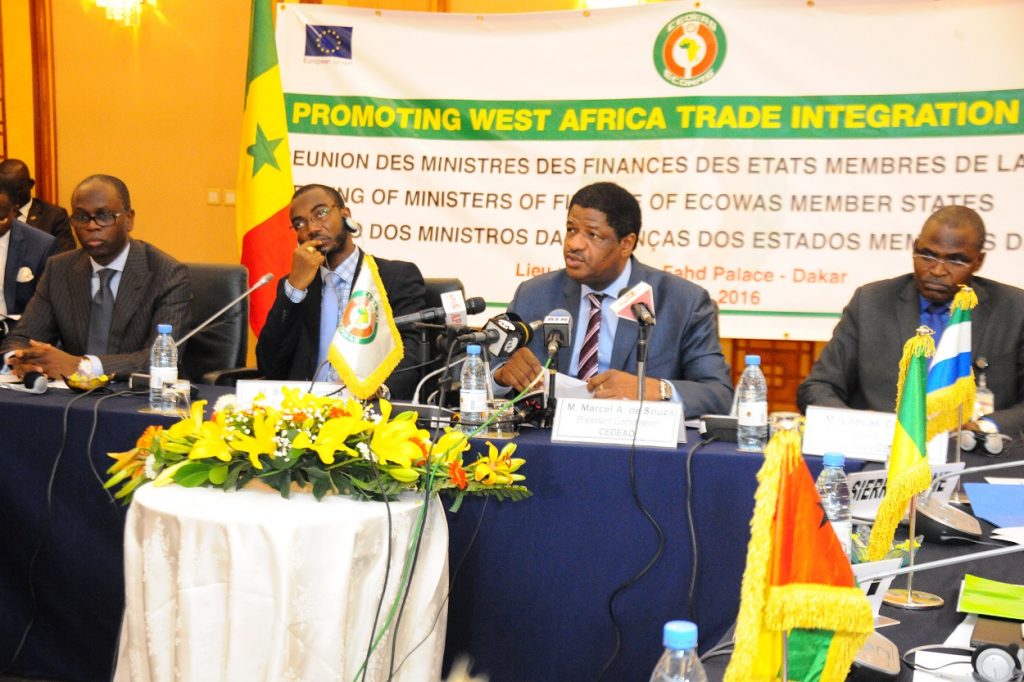Ministers of Finance Recommend Regular Review of ECOWAS CET Implementation
| Dakar, August 18, 2016
The Ministers of Economy and Finance of ECOWAS Member States have called on the regional organisation’s Commission to regularly assess implementation of the ECOWAS Common External Tariff (ECOWAS CET) and its impact on the Community’s economy, in order to ensure that the CET becomes a catalyst for the integration and economic development in West Africa. During a one day meeting on Thursday, August 18, 2016, in Dakar, Senegal, they took note of the status report on ECOWAS CET implementation in Member States, as well as reports of the 56th and 57th meetings of the Technical Committee on Trade, Customs and Free Movement within ECOWAS Countries. The status report on ECOWAS CET implementation revealed that Guinea-Bissau will start CET implementation in September 1, 2016, while Guinea, Gambia, Liberia and Sierra Leone stated that efforts have been deployed to ensure that CET implementation commences with effect from January 1, 2017 In other recommendations approved by the Ministers, Member States implementing the ECOWAS CET were urged to redouble efforts in making the regional tariff a reality within the Community. Member States requiring assistance in this area were also encouraged to contact to the ECOWAS Commission in that regard. The Commission was called upon to work with Member States implementing the CET, to ensure that all technical barriers to the implementation of the regional tariff are lifted, thereby enabling countries to contribute to the consolidation of the regional market. At the meeting’s opening session, the Minister of Finance and Development Planning of Liberia, Boima Kamara, whose country currently presides over the affairs of ECOWAS, expressed conviction that the various recommendations will help in promoting regional integration and enhancing trade for the development of the entire West African region. The Deputy Minister of the Economy, Finance and Planning, in charge of budget matters of Senegal, Birima Mangara, urged Member States to work harder to remove the restrictions that still hinder the development of intra-Community trade.
“The goal of increasing intra-Community trade and, especially, strengthening the competitiveness of regional production at the core of the CET, cannot be achieved without the removal of obstacles to the free movement of goods”, Mr. Mangara said. While speaking on the ECOWAS CET, the President of the ECOWAS Commission, Marcel A. Souza, said that it had become a public finance instrument for Member States. He went further to explain that the different assessment missions conducted show that custom revenues are significantly improved thereby dispelling the apprehensions on the CET’s impact on West African economies. “However, we note with concern that at present, six States are yet to respond, namely Cabo Verde, Gambia, Guinea, Guinea Bissau, Liberia and Sierra Leone. If the reasons advanced for non-implementation of the CET are justified, our Community will be hard-pressed to put up with the situation for much longer”, Mr. de Souza said. He pointed out that the existence of two or several tariff plans within the same community will result in the application of different custom duties on the same products. Therefore, the situation causes distortions to trade and undermines regional integration, cohesion between Member States and the proper functioning of the free trade area. As a reminder, the Heads of State and Government of ECOWAS at their 46th ordinary session on December 15, 2014 in Abuja, Nigeria, launched the implementation of ECOWAS CET which entered into force on January 1, 2015. The ECOWAS Common External Tariff was adopted on January 12, 2006 by the 22nd session of the Authority of Heads of State and Government of the regional organization. It is made up of a Tariff and Statistics Nomenclature (TSN) based on the harmonized system of designation and codification of goods (HS) of the MDGs, adopted by the Community, as well as a table of duties and taxes applicable to imported products. This table includes the Customs Duty (CD), Statistical Fee (SF), ECOWAS Community Levy, Import Adjustment Tax (IAT) and Special Protection Tax (SPT). |




